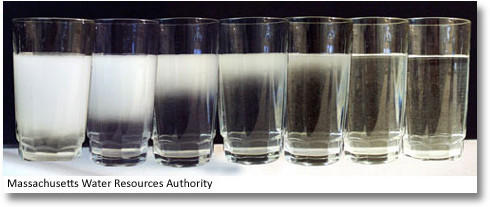If you’ve noticed that your hot water is cloudy but your cold water is clear, you may be wondering what’s causing the problem. There are a few possible explanations for why this may be happening. It could be due to minerals in your water, sediment build-up in your hot water heater, or a problem with the hot water heater itself.
In any case, it’s important to have a professional investigate the issue to determine the best course of action.
If you’re wondering why your hot water is cloudy but your cold water is clear, there are a few possible explanations. It could be due to sediment in your hot water heater, or it could be that your pipes are corroded. If you have an older home, it’s also possible that the problem lies with your plumbing system.
Whatever the cause, it’s important to get the problem fixed so that you can enjoy clear, hot water again.
Why is my water from the tap cloudy?
Why is My Hot Water Cloudy And Cold Water Clear?
If your hot water is cloudy but your cold water is clear, there are a few possible explanations. One possibility is that your hot water heater isn’t set to the correct temperature. The ideal temperature for hot water heaters is between 120 and 140 degrees Fahrenheit.
If your heater is set below this range, the water won’t be hot enough to dissolve all of the minerals in the Sediment can also build up in your pipes over time, causing cloudy hot water. Another possibility is that you have a leak in your pipes or fixtures. This can cause air to get into the system, which can make the water appear cloudy.
If you suspect a leak, it’s important to have it repaired as soon as possible to avoid further damage. Finally, if you have well water, it’s not uncommon for it to be slightly cloudy due to minerals in the groundwater. If this is the case, installing a whole-house filter can help improve the quality of your water.
Why is Only My Hot Water Cloudy?
There are a few reasons your hot water might be cloudy. One possibility is that your hot water heater isn’t set high enough. The water in the tank needs to be hot enough to kill bacteria, so if it’s not set high enough, the water can become contaminated.
Another possibility is that there could be sediment build-up in your hot water heater. Over time, minerals in the water can settle at the bottom of the tank and cause the water to appear cloudy. If you have an older hot water heater, it might not be as effective at filtering out sediment.
Finally, if you have hard water, that could also be causing your hot water to appear cloudy. Hard water contains higher levels of minerals like calcium and magnesium, which can make the water look murky.
If you’re noticing that your hot water is looking cloudy, it’s best to call a plumber to take a look and figure out what might be causing the problem.
Trying to fix it yourself could result in further damage or even injuries if you’re not familiar with working on plumbing systems.
Why is the Hot Water White And Cloudy?
If you’ve ever turned on your hot water and noticed that it’s white and cloudy, you may have been wondering what causes this phenomenon. There are actually a few different reasons why hot water can become cloudy, and understanding these causes can help you troubleshoot the issue and get your water running clear again.
One of the most common reasons for cloudy hot water is sediment build-up in your water heater.
Over time, minerals in the water can settle out and accumulate at the bottom of your tank. When you turn on the hot water, this sediment is stirred up and can cause the water to appear cloudy. Flushing your tank periodically can help to remove this sediment and prevent it from building up again.
Another possible cause of cloudy hot water is a reaction between the Hot Water Heater anode rod and the oxygen in the air. This reaction causes a small amount of rust to form on the anode rod, which can then enter into the hot water supply and make it appear cloudy. Replacing the anode rod with one made of a different material can help to prevent this problem from occurring.
If your hot water is consistently cloudy, it’s important to have a professional plumber take a look at your system to determine the cause. In some cases, such as when sediment build-up is severe, it may be necessary to replace your entire Hot Water Heater. However, if caught early enough, most causes of cloudy hot water are relatively easy (and inexpensive) to fix!

Credit: www.clearwatersystems.com
How to Fix Cloudy Hot Water
There are a few different things that could be causing your hot water to become cloudy. It is most likely due to minerals in your water, but it could also be caused by bacteria or sediments. If you have hard water, then it is likely that the minerals are causing the issue.
You can fix this by installing a water softener or using a distilled water for your hot water. If you think that bacteria might be the issue, then you can disinfect your hot and cold water lines with bleach. To do this, mix one cup of bleach with one gallon of water and run it through your faucets for about five minutes.
Afterward, flush out the lines with clean water. Finally, if you have sediments in your pipes, then you will need to have them cleaned professionally.
Cloudy Hot Water from Water Heater
If you have ever turned on your hot water only to be greeted with a blast of lukewarm water, you may be wondering why. There are several reasons this could happen, but one common reason is that your water heater’s tank has become filled with sediment. This happens over time as the water in your tank heats and cools, causing minerals to fall out of solution and settle at the bottom of the tank.
As more sediment accumulates, it insulates the heating element from the rest of the water in the tank, making it harder for heat to transfer into the water. As a result, your hot water may not be as hot as it used to be or it may take longer for hot water to reach your faucets.
If you think sediment might be build-up in your water heater’s tank is causing cloudy hot water, there are a few things you can do.
First, try flushing out your tank to see if that clears up the problem. You can do this by attaching a hose to the drain valve at the bottom of your tank and opening up all of the faucets in your home until all of the cloudywater has been flushed out. If this doesn’t work or if you don’t feel comfortable doing it yourself, you can always call a plumber to take care of it for you.
Kitchen Sink Hot Water is Cloudy
If you’ve noticed that the hot water coming from your kitchen sink is cloudy, there are a few possible explanations. First, it’s important to rule out any issues with your home’s water supply. If all of the water in your home is cloudy, it’s likely an issue with the municipal water supply and not your plumbing.
Assuming your cold water is clear, there are a few potential causes for cloudy hot water. One possibility is that sediment has built up in your hot water heater over time and is now being released into your pipes. This sediment can come from a variety of sources, including minerals in the water or rust from the tank itself.
Another possibility is that something is wrong with the anode rod in your hot water heater. The anode rod protects the tank from corrosion by sacrificial oxidation—in other words, it corrodes instead of the tank. If the anode rod isn’t functioning properly, it could be causing cloudiness in your hot water.
Finally, it’s also possible that there’s something wrong with your plumbing itself. If you have hard water, mineral deposits can build up inside pipes and cause them to become clogged or slow-running. This can lead to cloudy hot (and sometimes cold) water as well as other problems like reduced pressure or strange noises coming from pipes.
Conclusion
There are a few reasons your hot water might be cloudy while your cold water is clear. First, it could be due to the minerals in your water. As water heats up, these minerals can form deposits that make the water appear cloudy.
Second, it could be because of the way your hot water heater is designed. Some models have a sacrificial anode that helps protect against corrosion but can also cause the hot water to become cloudy. Finally, it could simply be that your hot and cold pipes are reversed.
If this is the case, you’ll need to have a plumber come out and fix them.

